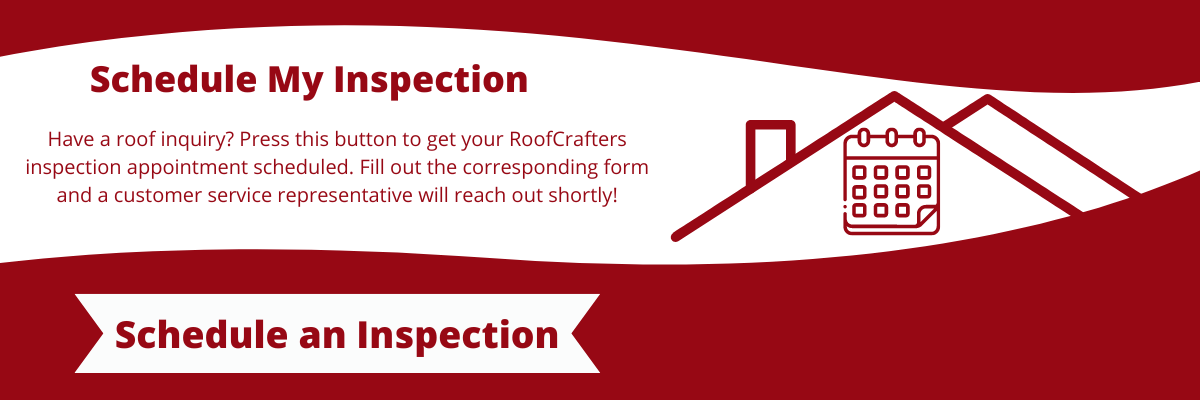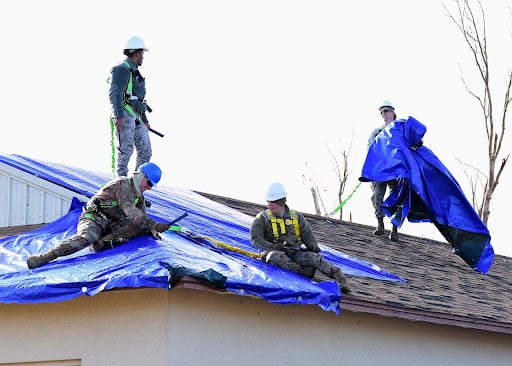
Being ensconced in your home, listening to a thunderstorm rage outside can be a truly cozy experience. That is, until you hear an unexpected crack and suddenly, water is pouring into your beloved Savannah living room. Quick, gather the buckets and towels!
We at RoofCrafters understand that this scenario is more of a nightmare than a cozy rainy day. Having aided homeowners in the Chatham County area. We've done so by repairing their storm-ravaged roofs for three decades and we've heard every harrowing tale. Yet, we firmly believe that there's always a solution.
If your home has suffered roof damage due to a storm. You've come to the right place. RoofCrafters is here to provide all the services you might need, be it a simple repair or a total roof replacement. We've got your back, Savannah.
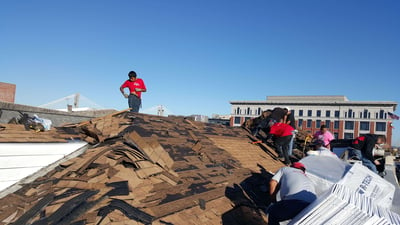
Storm damage is a critical issue that needs immediate attention to prevent further harm to your roof and your home. Being here chances are you're dealing with some storm damage and are uncertain about how to proceed. In this piece, you'll learn about the various types of storm damage specific to our Sea Port city, and how to approach the repair process. Let's dive right in!
Common Forms of Storm Damage in Savannah, Georgia
Storm damage to roofs can take various forms, each associated with the specific characteristics of the storm. Fortunately, most insurance companies tend to cover damages caused by these natural events.
Here are the four frequently encountered types of roof storm damage in our region:
- Damage from Hailstorms
- Rain-Induced Damages
- Damage Caused by Falling Trees
- Wind-Related Roof Damage
Hailstorms and Their Impact on Savannah Roofs
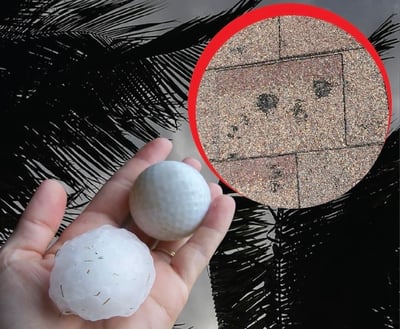
Hailstorms, though less common in Savannah's balmy climate, can still pose a significant threat when they do occur. These ice pellets, hurled from the sky, can inflict severe damage to your roof and other exterior parts of your home. After a hailstorm, be sure to look for these telltale signs of roof damage.
Signs of Hail Damage to Watch Out for in Savannah:
- Dimples and depressions on shingles
- Shattered or fractured shingles
- Excessive granule loss in the gutters
- Denting on the metal flashings and gutters
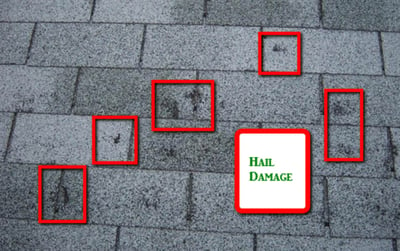
Proactive inspections and repairs are crucial after a hailstorm. The damage inflicted by hail can compromise the integrity of your roof, providing a gateway for pests and moisture. If left unattended, this could escalate into major issues like mold growth or pest infestations. Eventually, turning a hailstorm's aftermath into a full-blown housing crisis.
The Destructive Power of Rain in a Coastal Region
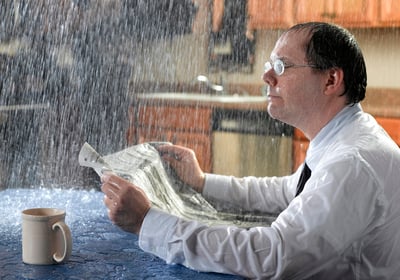
The beating of rain on your roof can be a soothing sound until it morphs into a thunderstorm potent enough to wreak havoc on your home. Rain, particularly in South Georgia's humid climate, can turn into a homeowner's nightmare. This can lead to extensive property damage and even flooding in severe cases.
Here are the common signs of rain-induced damage to be aware of:
- Cracked, missing, or warped shingles
- Discoloration or blistering of the ceiling paint
- Bulging spots on the ceiling
- Stagnant water or dark patches on the roof
- Signs of mold growth
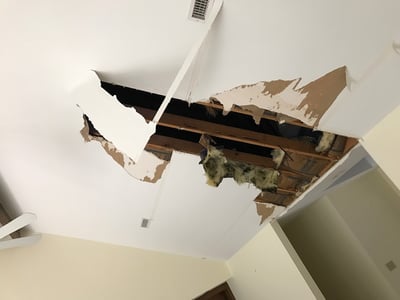
In extreme situations, a roof leak could be so severe that you'd need to resort to buckets for collecting dripping water. And if your roof wasn't properly installed, you might experience random leaks. This could potentially void your insurance coverage. Always choose a reputable contractor for repairs and roof replacements to mitigate long-term costs.
Wind Damage in Chatham County
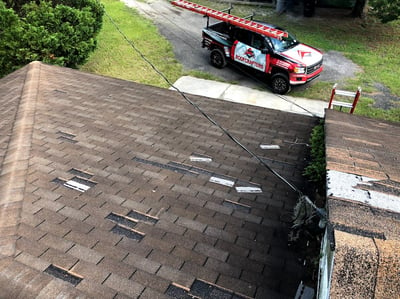
In the seaport city of Savannah, wind damage to roofs is not uncommon. It's a common misconception that only strong winds cause roof damage. Even with lighter materials, like asphalt shingles popular in many Savannah homes, moderate winds can cause serious damage. This may cause cracks or even lead to missing shingles after a strong wind storm.
Spotting wind damage isn't always straightforward, especially when it's minor. Closely inspect the shingles for signs of creasing or tearing. If you notice loose granules from the shingles, it might be time to call in a professional roofer for a thorough inspection.
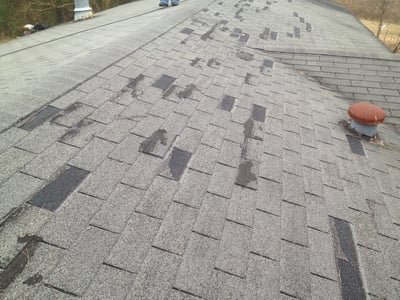
After a significant wind storm, it's not rare to discover cracks and punctures in your roof or experience water leakage. An experienced storm damage contractor can assist in these situations. They'll carry out temporary repairs to stave off further damage. At least until your insurance company approves the necessary repairs.
For properties in Savannah with metal or slate roofs, the probability of a wind storm causing damage is much lower. Yet, it's still best to have it checked after severe weather conditions.
Addressing Storm Damage Roof Repairs in Greater Savannah
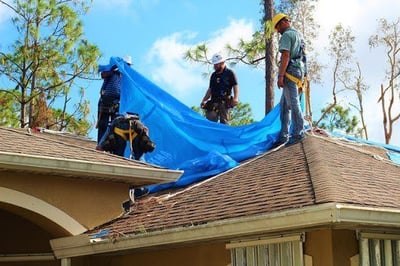
When storm damage impacts your roof in Greater Savannah, your immediate steps can determine the extent of the problem. Firstly, turn off the power supply to lessen the risk of electrical fires. If a leak is present, move any furniture, electronics, valuable clothing, and personal items away from the water's path.
Always focus on your safety and that of your family. If the situation requires, evacuate your home promptly. Once you've addressed the immediate concerns, it's time to call in a professional roofer. One familiar with Chatham County's unique weather patterns to address the issue.
There might be instances where securing a same-day appointment with your roofer could be challenging. During this waiting period, take steps to mitigate further damage to your property as much as possible.
Contacting Your Insurance Company in Georgia
Assuming you've adhered to your insurance terms of service, storm-related damage repairs to your roof should be easy. Document the storm damage to confirm the need for repairs or replacements covered by your insurance policy. After having your roof evaluated by a professional roofer in Savannah, you'll then want to get in touch with your insurance company.
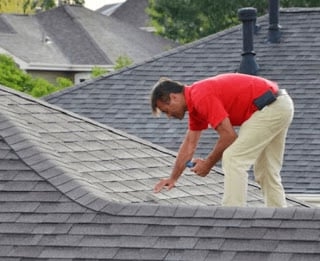
To remain eligible for insurance claims in Greater Savannah, ensure you follow these steps:
Choose a competent roofer. Inadequate roof repairs or installations performed by a budget contractor may not be insurable. Remember, roofers charge based on their skill and experience, making your choice important.
Avoid DIY roof fixes or installations. Roofing is a specialized area; don't attempt to handle installations or repairs on your own.
Keep your roof in good condition. Annual inspections by a reputable roofer can help diagnose and fix problems before they lead to costly interior repairs.
Carry out visual inspections. While not comprehensive, a visual check can give you an idea if anything appears out of the ordinary with your roof.
Replace your roof when necessary. Every roof has a lifespan, after which it begins to develop issues. Most insurance companies provide limited or no coverage for roofs older than 15-20 years.
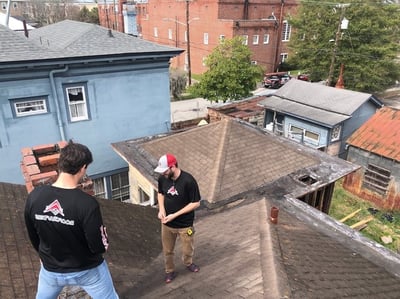
Always have a roofing contractor inspect the roof after you see impact damage by hail or falling tree limbs. There might be structural damage that isn't immediately clear. Better to be safe than sorry in such situations, as insurance won't cover damage deemed to have resulted from negligence.
Steps to Address Your Storm-Damaged Roof in Savannah Georgia
There are several actions you can take to mitigate your storm-damaged roof in the Greater Savannah area! The initial step is to understand the type of damage your roof has sustained. As mentioned in this article, the most common types of storm damage are from hail, rain, wind, and the after-effects of these storms.
If you assume you have damage, your next step should be to reach out to a contractor experienced in insurance claims in Chatham County. They'll provide clear guidance on the situation and help you determine your next steps.
If you have more questions about storm damage. Or if you're uncertain about what your insurance will or won't cover, we encourage you to explore the resources in our learning center. Ready to address your storm damage concerns with professionals local to the Savannah area? Reach out to our family here at RoofCrafters. One of our friendly client experience agents will get back to start your storm damage repair journey.
At RoofCrafters, our mission is to provide job opportunities for others to thrive and grow while making a meaningful impact within our communities.



